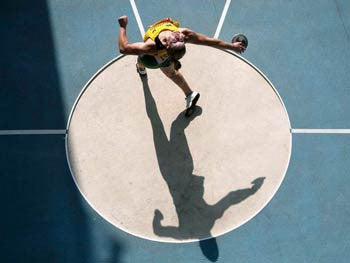“Happiness doesn't result from what we get, but from what we give.” ― Ben Carson (No political statement is being made. I just liked the quote.)
Maybe you’ve heard the “participation trophy” argument that has been discussed over the last year. I have always looked at this topic from the top of the fence, not on either side. This is really not me, as I have a concrete opinion on everything. Ask my husband! A participation trophy makes sense to me for young children. At some point, though, I think the competitive drive can be a good thing. Two of my sons lost every lacrosse game for an entire season. But they never felt like losers because it didn’t deflate them or make them feel bad about themselves. I’m pretty frank with my children. They know about my failures, and I share my regrets. The stories are always followed up with how those moments shaped me. Sure, it’s kind of a cliché, but it’s also true.
That said, I wasn’t prepared for the lesson I was about to learn from my 15-year-old son. He has been a shy boy, likes being at home, and is really not worried about what other kids do or how they do it. I’m not going to lie – it baffles me, even concerns me at times. I’d like him to have more friends, go to the movies, or strike up a conversation with someone. I know, I know. I should embrace his ability to be his own person. After all, it takes some of us years to get there.
Last year, he began throwing the discus and running track at school. This is great. His dad was an All American in track and field. Our son would follow in his dad’s footsteps and be awesome. Only, his awesomeness wasn’t what we expected. Get ready because I’m about to be painfully honest and tell you the lose-lose situation we created. At the first several meets, he chose to sit next to me while he waited his turn. I watched his fellow classmates socialize and goof off all the while wishing he would go goof off with them. Why doesn’t he go talk to them? Why does he want to sit with his mother? Isn’t that violating all sorts of teenager rules? This is the way year one went. His athletic abilities got him to State on his summer team, but he was indifferent to winning.
Flash forward to season two. We pump him up and tell him how awesome he can be. “Hey, you could really win this year!” He does have a dad that can train him beyond what the other kids get at school. We head out to the first track meet. What’s going on here? He isn’t sitting next to me. He’s socializing, goofing off. He is smiling and laughing. I’m thrilled. He gives some instruction to a couple of classmates, and even lets a competitor use his own personal discus when it’s his turn. His friend has a great meet. My son, not so much. He doesn’t even realize his throws are short and he won’t place at all. After the meet, his friend thanks him for the tips and letting him use the discus. His friend got second place.
My son walks over to us as happy as ever having just had a good time with his friends. We start in with, “Why didn’t you throw farther? Do you realize it wasn’t a great night for you?” Tears come to my eyes when I think back to this moment. As our interrogation continued, his whole demeanor changed. The smile turned to a frown, his shoulders fell, and the joy he felt after having had a good time with his friends was over.
This wasn’t the only time he helped someone at his own expense. Not long after the track incident I was at school one day with my younger son. There were several girls working the orchestra table. When I said my last name, they came to life. Two of them had all kinds of great stories about how my son had helped them and how nice he was. Later in the week, I noticed that one of the girls was a higher chair.
Winning isn’t everything. Will it really matter that my son didn’t do well at a track meet in 8th grade? Will it really matter that he wasn’t first-chair viola? No and no. He gets so much joy from helping people. Helping people is how he wins. Why wouldn’t I know that about him? It wasn’t the first time he helped someone. I’ve seen him walk up to a woman carrying bags of groceries and ask to help. He jumped at the chance to go to Honduras on a church mission. Why wouldn’t he? Our message has always been that there is no greater gift than to touch someone, to change the course of their day for the better. I guess in our minds the message had a caveat - help people as long as it doesn’t impact your performance.
I wish I could go back and tell him how great it was to see him socializing at his meet that day. I wish I hadn’t mentioned how poorly he performed. He ventured outside of his comfort zone. Maybe it was because we had encouraged him to engage more. Parents can’t decide when their child will come out of their shell. It’s not our timing; it’s theirs.
We went to watch him win a track meet… instead we watched him win at life.
Heather Whiting

